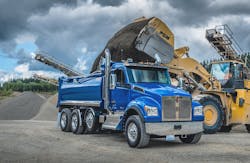Benefits of leasing vocational trucks
By: Chuck Davis, PacLease Director of Sales
The status quo is no longer the status quo.
Vehicle technology continues to evolve. Fast. And finding technicians to maintain those pieces of equipment has become a never-ending challenge. We’re seeing electric trucks coming on to the scene for local pick-up and delivery and regional hauls, and hydrogen electric is on the horizon.
Content provided by PacLease
Blink and we’ll start seeing that technology enter vocational markets. Yes, things are evolving, and you can bet engineers are hard at work developing trucks and equipment you’ll be using down the road.
While equipment is changing, so too is how that equipment is being acquired. Historically, vocational equipment has been purchased and owner maintained. But that pendulum has begun to swing in a different direction over the past several years. Today, construction companies with dump trucks, tank wagons, and concrete mixers are moving to full-service leasing. So are those operating in waste haul and septic tank applications, along with those in fuel hauling and propane. Name the vocation and often there is a leasing option.
Diving deeper, we’re finding full-service leasing is making sense for a lot of smaller to mid-size vocational customers, and for larger ones that are branching out with new locations with a limited number of trucks. Vehicle maintenance is a necessary evil, and it must be done on time and correctly to avoid downtime. But the volume might not be there to set up your own shop—andthat’s a key benefit that leasing offers. What’s more, maintenance can be flexible. We’ve seen some customers who have their own shop and want to have their own techs work on the bodies, while the leasing company handles maintenance on the trucks. That way the company can expand but not have to expand its own shop.
In the past, leasing companies were hesitant to lease to those using specialty bodies—the package is harder to spec, and technicians aren’t often trained in performing maintenance and repairs on vocational trucks. Then there is selling the vehicle on the back end. Combined, it meant those wanting to lease a vocational truck—for all the financial and maintenance benefits—found a lot of deaf ears.
Although it’s true that many full-service leasing companies still avoid offering leases for vocational trucks, some welcome the opportunity to do business. PacLease, for example, is part of Paccar and a PacLease franchise is usually a sister company of a Peterbilt or Kenworth dealership. Although many leasing franchises have their own dedicated shops, they can still work with their dealership’s maintenance facility to help service and maintain vocational vehicles if the need arises. And there normally is a waiting list of customers awaiting trucks coming off a full-service lease—much of that is due to knowing how well these trucks are maintained. This takes away a lot of the apprehension of leasing vocational trucks for the lessor.
How the finances of truck leasing works
When it comes to the financial aspect of leasing versus ownership, a full-service lease gives lots of options. First and foremost, leasing helps conserve capital. Instead of having to bankroll the cost of the chassis and body or obtaining a loan with up to a 30 percent down payment, a lease affords more options, plus it frees your credit line. There are two types of leases: an operating lease and a capital lease. Terms can range from 36 to 84 months, typically based on mileage or hours and the maintenance curve.
A capital lease has the intent to transfer ownership at the end of term where there can be a balloon payment or a purchase price of just $1. In an operating lease, ownership does not transfer at the end of term. The company that has an operating lease has a monthly payment that covers the usage cost over the term based on the estimated end of term residual value of the vehicle, as set by the lessor. The most common operating lease is called a Fair Market Value lease or FMV where the lessee has no obligation to the equipment at the end of the term, often referred to as a walk-away lease. The operating lease results in a significantly lower monthly payment compared to the $1 buy out or conventional $0 loan. Lower payments equal improved cash flow, and cash flow is often king when it comes to growing a business. The great news for vocational users is that you do not have to give up ownership in an operating lease. Vocational leases often use a TRAC (Terminal Rental Adjustment Clause) structure that keeps payments low and provides a known end-of-term purchase price for the customer.
Another advantage of some leasing programs is the ability to customize payments based on your situation. For example, some construction companies in the northern states, or in Canada, might have little business in the winter months. Cash flow will differ, so to take that into account a leasing company can structure a seasonal payment program, or even do a “skip” payment program.
When it comes to taxes and write offs, leasing still can help you out. Many companies use the capital lease to take advantage of tax depreciation. But what some don’t realize is that you won’t lose that benefit with an operating lease.
Lastly, leasing gives you certainty in the form of a monthly set payment. It takes away the ups and downs of unplanned vehicle maintenance and repairs. This allows for better and more accurate budgeting and a few less sleepless nights.
Chuck Davis has been a full-service truck leasing executive for 35 years. Over the past 15 years, he’s been at Paccar Leasing (PacLease) where he has served in leadership roles that include location growth and company operations. Currently he is director of sales for the United States and Canada. Chuck holds an MBA from Kennesaw State University and is a Certified Transportation Professional from the National Private Fleet Council.
